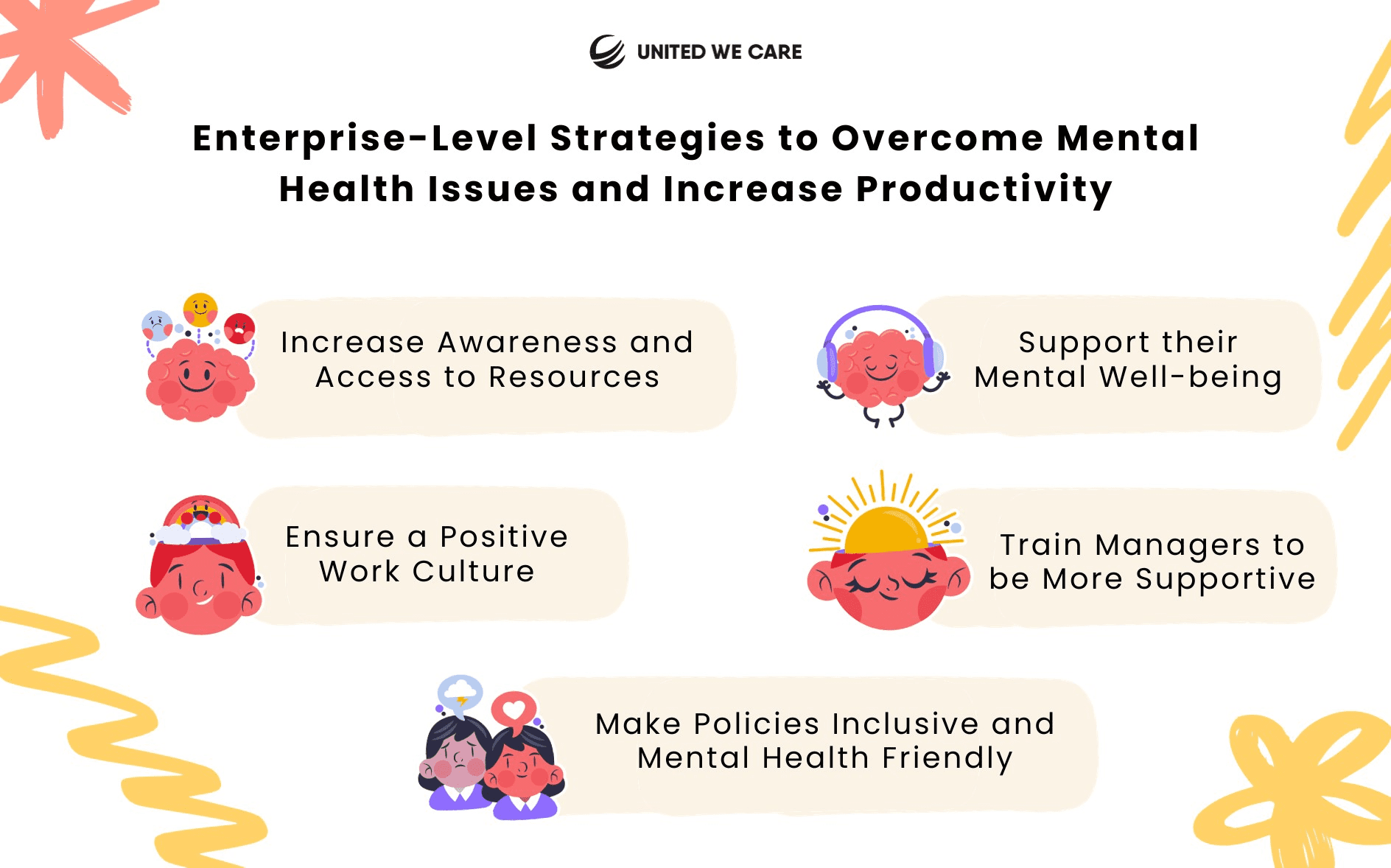Introduction
For an enterprise, human beings or their employees are resources. This is a common understanding in the world of work. If employees are not able to produce, the enterprise will falter. Yet, even today, many people mistake human beings for a machine and forget that for employees to work well, the employee must work in a condition that is conducive to their wellness. If the employee struggles with basics, such as good physical and mental health, that resource will not be able to produce to the best of their capacity. Mental health has a significant impact on employee productivity, absenteeism, willingness to work and satisfaction with the job. This article will shed light on the impact of mental health on employee productivity and how strategies at the enterprise level can be more mindful of this impact.
Understanding Employee Productivity At The Enterprise Level
In the last few years, the word productivity has entered the vocabulary of most people. Productivity essentially means the output a person/company can produce when there is an input of resources. Each company defines for itself what its resources are and what its outputs are to measure this construct of productivity.
When we consider the productivity of an employee, we are talking about their ability to produce results by using both the company and personal resources. If there are limited resources in the environment, difficulty in accessing resources, a lot of strain, or, for some reason, the employee is not able to access their own mental and physical resources, there will be a decline in productivity.
Understanding Mental Health Issues Employee Productivity At The Enterprise Level
There is an increase in the mental health concerns that people are facing, especially in their workspaces. Deloitte conducted a global survey with over 14000 Gen Z workers and over 8000 millennial workers. The findings were termed as a “wake-up call” for employers as 46% of the GenZ responders and 39% of the millennial responders reported feeling constantly anxious or stressed at work. Roughly half of both groups reported feeling burnout. The survey also found a hesitancy in admitting mental health issues to their bosses when taking time off for their mental health [1].
In another survey, 28% of employees reported quitting due to mental health issues, and roughly 40% admitted that their work culture had a significant negative impact on their mental health. Interestingly, the survey also found that there still is a stigma around mental health because the majority of the responders admitted to taking time off for their health. Still, they also reported feeling guilty for doing so [2].
There are many reasons for mental health concerns. The most commonly identified reasons include [2] [3] [4]:
- Relationship problems with superiors and//or colleagues
- Work Overload
- Unrealistic time pressure
- Unfair treatment at work
- Inadequate compensation
- Lack of support in the organisation
- Job insecurity
- Role ambiguity
- Poor work-life balance
- Lack of flexibility and control in one’s role
- Physical work environment
- Lack of inclusivity in the workplace
It is now well understood that employee burnout and mental health are the responsibility of the enterprise [4]. Not only that, the consequences of employee mental health issues directly contribute to the cost an enterprise bears. Maybe that is why these factors are a “wake-up call” for companies across the world.
The Impact of Mental Health on Employee Productivity At The Enterprise Level
The connection between mental health and productivity is profound. According to WHO, globally, 12 billion working days are lost due to mental health concerns. The cost of this is $1 Trillion per year in terms of productivity [5].
Research in psychology and management has captured the details of the impact of mental health on employee behaviour and work. Mental health has a significant impact on
- Absenteeism: Studies have found that when employees struggle with mental health issues, they are more likely to take leave and stay absent from the job [6] [7].
- Presenteeism: Studies have also indicated that even when employees turn up to work, they have lowered productivity when they are struggling with mental health issues [6] [7].
- Turnover Intention: Employees who struggle with psychological distress or lower well-being also have a high intention to quit their jobs [8].
Poor mental health and experience of chronic stress that leads to burnout have other consequences as well. For instance, the employee begins to withdraw from the team; their social relationships decrease, and cynicism and negativity increase. They may also show constant irritation, low motivation or attention towards work and anger outbursts [9].
Enterprise-Level Strategies to Overcome Mental Health Issues and Increase Productivity

Surveys indicate that employees want more open mental health dialogue [2]. Enterprises can do a number of things to improve their work culture and overcome productivity issues by promoting mental health. Some strategies include [10] [11]:
- Increase Awareness and Access to Resources: Many companies shy away from talking about topics related to mental health. Training, resources, and sessions on mental health, stress reduction, and burnout prevention can do wonders for clients.
- Support their Mental Well-being: Companies can provide more material support with things like Employee Assistance Programs that focus on mental health. Along with that, enterprises can invest in providing reimbursement for therapy, medication, or other wellness activities for the well-being of employees.
- Ensure a Positive Work Culture: A work culture where employees are not overworked, are provided adequate compensation, are psychologically safe, and are valued promotes well-being. Further, encouraging work-life balance and promoting personal discussions around mental health can be really beneficial for the employees.
- Train Managers to be More Supportive: Often, managers are unable to provide adequate support for the employees when they share their concerns. Training managers to be more empathetic, supportive, and discerning enough to understand what the employee needs can greatly benefit the mental health of the employee.
- Make Policies Inclusive and Mental Health Friendly: Employers must review their policies to ensure that they are inclusive of diverse populations. Policies need to have provisions for people with disabilities, developmental disorders, and mental helth, and must be fair to people of all races, religions, and genders. Equitable distribution of resources can help promote mental health overall.
Conclusion
It has become abundantly clear that to have a productive environment, enterprises cannot afford to ignore mental health. There is a rise in mental health concerns but also a rise in awareness around mental health issues. Employees are taking a stand for their well-being and choosing enterprises which are supportive, inclusive, and fair. To ensure productivity and avoid concerns like absenteeism, presenteeism, and turnover, enterprises need to make changes and provide an atmosphere which is conducive to mental well-being.
If you are an organisation that wishes to improve employee productivity and mental health, you can contact us at United We Care. We provide a range of services, including EAPs and workshops for supporting employees and enterprises.
References
[1] “The Deloitte Global 2023 gen Z and millennial survey,” Deloitte, https://www.deloitte.com/global/en/issues/work/content/genzmillennialsurvey.html (accessed Sep. 29, 2023).
[2] K. Mason, “Survey: 28% have quit a job because of their mental health,” JobSage, https://www.jobsage.com/blog/survey-do-companies-support-mental-health/ (accessed Sep. 29, 2023).
[3] T. Rajgopal, “Mental well-being at the Workplace,” Indian Journal of Occupational and Environmental Medicine, vol. 14, no. 3, p. 63, 2010. doi:10.4103/0019-5278.75691
[4] J. Moss, Reprint h05bi7 published on HBR.ORG December – executives Global Network, https://egn.com/dk/wp-content/uploads/sites/3/2020/08/Burnout-is-about-your-workplace-not-your-people-1.pdf (accessed Sep. 29, 2023).
[5] “Mental health at work,” World Health Organization, https://www.who.int/news-room/fact-sheets/detail/mental-health-at-work (accessed Sep. 29, 2023).
[6] M. Bubonya, “Mental health and productivity at work: Does what you do matter?,” SSRN Electronic Journal, 2016. doi:10.2139/ssrn.2766100
[7] C. de Oliveira, M. Saka, L. Bone, and R. Jacobs, “The role of mental health on Workplace Productivity: A critical review of the literature,” Applied Health Economics and Health Policy, vol. 21, no. 2, pp. 167–193, 2022. doi:10.1007/s40258-022-00761-w
[8] D. Bufquin, J.-Y. Park, R. M. Back, J. V. de Souza Meira, and S. K. Hight, “Employee work status, mental health, substance use, and career turnover intentions: An examination of restaurant employees during COVID-19,” International Journal of Hospitality Management, vol. 93, p. 102764, 2021. doi:10.1016/j.ijhm.2020.102764
[9] D. Belias and K. Varsanis, “ORGANIZATIONAL CULTURE AND JOB BURNOUT – A REVIEW,” International Journal of Research in Business Management, 2014.
[10] A. Kohll, “How to create a workplace that supports mental health,” Forbes, https://www.forbes.com/sites/alankohll/2018/11/27/how-to-create-a-workplace-that-supports-mental-health/?sh=1200bf87dda7 (accessed Sep. 29, 2023).
[11] “5 ways to improve employee mental health,” American Psychological Association, https://www.apa.org/topics/healthy-workplaces/improve-employee-mental-health (accessed Sep. 29, 2023).










